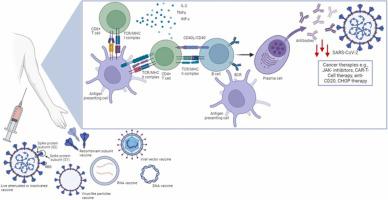Cytokine & Growth Factor Reviews ( IF 13.0 ) Pub Date : 2023-11-30 , DOI: 10.1016/j.cytogfr.2023.11.004 Demi Wekking , Thilini H. Senevirathne , Josie L. Pearce , Marco Aiello , Mario Scartozzi , Matteo Lambertini , Pushpamali De Silva , Cinzia Solinas

|
The COVID-19 pandemic poses a significant challenge for individuals with compromised immune systems, such as patients with cancer, as they face a heightened susceptibility to severe infections compared to the general population. Such severe infections substantially increase the risk of morbidity and mortality among these patients. Notable risk factors for mortality include advanced age (> 70 years), current or past smoking history, advanced disease stage, the use of cytotoxic chemotherapy, and an Eastern Cooperative Oncology Group (ECOG) score of 2 or higher. Multiple types of vaccines have been developed and implemented, demonstrating remarkable efficacy in preventing infections. However, there have been observable reductions in their ability to elicit an immune response, particularly among individuals with hematological malignancies. The situation becomes more challenging due to the emergence of viral variants of concern (VOCs). Despite the increase in neutralizing antibody levels after vaccination, they remain lower in response to these evolving variants. The need for booster vaccinations has become apparent, particularly for this vulnerable population, due to the suboptimal immune response and waning of immunity post-vaccination. Examining and comprehending how the immune system reacts to various vaccination regimens for SARS-CoV-2 and its VOCs in cancer patients is crucial for designing clinical and public health strategies. This review aims to provide an updated overview of the effectiveness of COVID-19 vaccines in cancer patients, including those undergoing treatments such as hematopoietic stem cell transplantation (HCT) or chimeric antigen receptor (CAR) T cell therapy, by exploring the extent of both humoral and cellular immune responses to COVID-19 vaccination. Furthermore, it outlines risk factors and potential biomarkers that are associated with severe SARS-CoV-2 infection and vaccine responses, and offers suggestions for improving SARS-CoV-2 protection in cancer patients.
中文翻译:

COVID-19 对癌症患者的影响
COVID-19 大流行给免疫系统受损的个体(例如癌症患者)带来了重大挑战,因为与普通人群相比,他们更容易受到严重感染。此类严重感染大大增加了这些患者的发病和死亡风险。值得注意的死亡危险因素包括高龄(> 70岁)、当前或既往吸烟史、晚期疾病分期、细胞毒性化疗的使用以及东部肿瘤合作组(ECOG)评分为2或更高。多种类型的疫苗已被开发和实施,在预防感染方面显示出显着的功效。然而,它们引发免疫反应的能力明显下降,特别是在患有血液恶性肿瘤的个体中。由于关注病毒变种 (VOC) 的出现,情况变得更具挑战性。尽管接种疫苗后中和抗体水平有所增加,但它们对这些不断变化的变异的反应仍然较低。由于免疫反应欠佳和疫苗接种后免疫力下降,加强疫苗接种的需求已变得显而易见,特别是对于这一弱势群体。检查和理解癌症患者的免疫系统对 SARS-CoV-2 及其 VOC 的各种疫苗接种方案的反应对于设计临床和公共卫生策略至关重要。本综述旨在通过探讨癌症患者(包括接受造血干细胞移植(HCT)或嵌合抗原受体(CAR)T 细胞疗法等治疗的癌症患者)的有效性,提供最新的 COVID-19 疫苗有效性概述。对 COVID-19 疫苗接种的体液和细胞免疫反应。此外,它概述了与严重 SARS-CoV-2 感染和疫苗反应相关的风险因素和潜在生物标志物,并为改善癌症患者的 SARS-CoV-2 保护提供了建议。



























 京公网安备 11010802027423号
京公网安备 11010802027423号